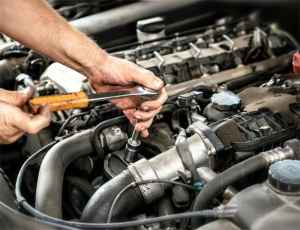If your car is jerking when accelerating at low speeds, it can be a cause for concern. If left unresolved, the problem could worsen and lead to more costly repairs. In this article, we explore some common causes and provide guidance on how to diagnose and repair the issue.
Common Reasons for Car Jerking at Low Speeds
There are a number of reasons why your car may jerk when accelerating at low speeds. Below are some of the most common causes:
-
Poor Maintenance – Regular maintenance of your vehicle can help prevent jerking issues from occurring in the first place. Make sure you adhere to the manufacturer’s maintenance schedule so any underlying problems can be identified early on and rectified where possible. It is also important to check tire pressure regularly as low tire pressure can also cause jerking issues at lower speeds.
-
Engine Problems – An engine misfire or malfunctioning ignition system could be causing your car to jerk when accelerating at low speeds. This could be due to worn spark plugs, faulty wiring, or other engine-related problems that need to be addressed by a professional mechanic as soon as possible before they become worse and more costly repairs are needed down the line.
-
Clogged Fuel Filter – If your car’s fuel filter is clogged, it can lead to a decrease in fuel flow and cause your car to jerk when accelerating at low speeds. It is important to ensure that the fuel filter is checked and replaced as per the manufacturer’s instructions in order to maintain optimal engine performance.
-
Faulty Spark Plugs – Worn or faulty spark plugs can cause your car to jerk when accelerating at low speeds as they are responsible for igniting the air-fuel mixture in the engine cylinder. It is important that you replace spark plugs every 30,000 miles or as recommended by your vehicle manufacturer in order maintain optimal engine performance and reduce jerking issues.
-
Dirty Air Filter – A dirty air filter restricts airflow into the engine which can lead to a decrease in power output and cause jerking issues when accelerating at low speeds. Be sure to check and replace your air filter regularly (as per manufacturer’s instructions) so that you maintain optimal engine performance and reduce jerking issues while driving at lower speeds.
Taking the Next Steps
If you have identified any of these common reasons for why your car may be jerking while driving at lower speeds, it is important to take the relevant steps in order to diagnose and rectify any problems as soon as possible. This might mean taking your car to a qualified mechanic, who will be able to identify and fix the underlying issue. It could also involve purchasing and installing a new air filter, spark plugs or fuel filter if these are found to be the cause of the jerking.
Conclusion
If your car is jerking when accelerating at low speeds, it is important to identify the reason for this issue so it can be rectified accordingly. Poor maintenance, engine problems, clogged fuel filters, faulty spark plugs and dirty air filters can all be responsible for causing your car to jerk when accelerating at low speeds. It is important that you take immediate action if you suspect any of these issues are present in order to ensure optimal engine performance and reduce costly repairs down the line.

 Clogged Fuel Filter – If your car’s fuel filter is clogged, it can lead to a decrease in fuel flow and cause your car to jerk when accelerating at low speeds. It is important to ensure that the fuel filter is checked and replaced as per the manufacturer’s instructions in order to maintain optimal engine performance.
Clogged Fuel Filter – If your car’s fuel filter is clogged, it can lead to a decrease in fuel flow and cause your car to jerk when accelerating at low speeds. It is important to ensure that the fuel filter is checked and replaced as per the manufacturer’s instructions in order to maintain optimal engine performance.
Add Comment